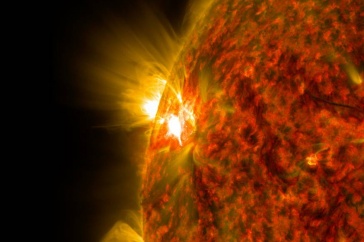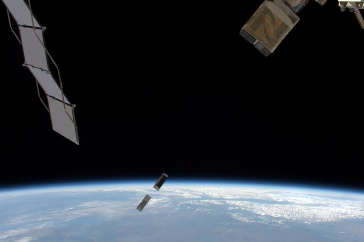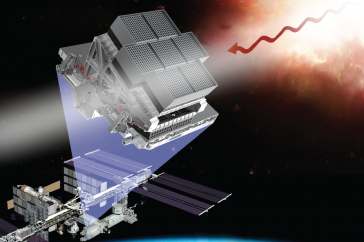
Image credit: NASA
Researchers at UNH will receive $1.1 million from NASA over five years to study space weather as part of the innovative Center for Geospace Storms (CGS). Space storms originating from our sun can wreak havoc on satellite communications, GPS technologies and astronauts in space, so scientists are developing new methods to improve their predictions of space weather events to protect infrastructure and human health.
The CGS is designated as a Diversify, Realize, Integrate, Venture and Educate (DRIVE) Center that relies on a wide range of expertise to achieve major breakthroughs in heliophysics — the study of the sun and its impact on the Earth, solar system and space weather. NASA recently announced that the CGS, along with two other DRIVE centers, will advance to phase 2 funding, which will support expanding the model development, scientific studies and education and outreach activities initiated during phase 1. CGS was one of 12 DRIVE Centers supported in phase 1.

The CGS team, led by the Johns Hopkins University Applied Physics Laboratory, is taking a unique approach to studying and predicting space weather: it is developing a new model that takes into account multiple systems, including the magnetosphere, ionosphere and the upper atmosphere, for a more holistic — and more accurate — view of what happens when solar flares interact with the layers of Earth’s atmosphere.
Amy Keesee, associate professor of physics in the UNH Space Science Center and the College of Engineering and Physical Sciences, will serve as the UNH lead for this project, in which she will coordinate the scientific contributions from colleagues including Harlan Spence, the director of the UNH Institute for the Study of Earth, Oceans, and Space, and Steve Hale, a project director for the UNH Leitzel Center who will serve as a project evaluator. The funding also provides support for two UNH graduate students to travel and conduct research with the other institutions that are part of the CGS.
Keesee serves as the overall CGS education lead, charged with coordinating activities for undergraduate and graduate students at the member institutions including a seminar series, guest lectures in courses and conducting research while being hosted at the Johns Hopkins Applied Physics Laboratory or the U.S. National Center for Atmospheric Research.
“The goal of CGS Education is to produce scientists with deep knowledge integration, who have understanding of different regions within geospace and also the ability to study them through both simulation and data analysis,” Keesee says.
“We are thrilled to be part of CGS because it leverages UNH’s space science strengths toward addressing a grand science challenge, empowering the heliophysics community, developing tomorrow’s workforce and leaders, enhancing space weather preparedness and engaging with the broader public,” Spence adds.
-
Written By:
Rebecca Irelan | Institute for the Study of Earth, Oceans, and Space | rebecca.irelan@unh.edu | 603-862-0990



















































